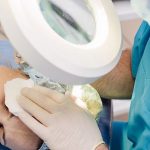Skin cancer is the most common of cancers, with nearly 10,000 people in the U.S. diagnosed every day. If you have recently been diagnosed with skin cancer, you may be wondering what happens next.
Chances are you were screened for skin cancer when you discovered a mole that changed shape or an abnormal patch of skin on your body. Early detection is key in diagnosing and treating skin cancer before it spreads. Skin cancer can occur anywhere on your body, from your scalp to the soles of your feet.
Testing for skin cancer involves a dermatologist examination of the concerning area. If cancer is suspected, the abnormal skin tissue will be removed and examined under a microscope. If cancer cells are found, the doctor will be able to determine which type you have.
There are three types of skin cancer: basal cell carcinoma, squamous cell carcinoma and melanoma. If treated early, basal and squamous cell carcinomas do not spread to other parts of the body. Melanoma is the most aggressive form of skin cancer and can spread.
What happens after a skin cancer diagnosis?
Once you receive a skin cancer diagnosis, your dermatologist will explain the results and determine the best course of action for your case. The team at Columbia Skin Clinic specializes in skin diseases and can provide treatment. There are different methods for treating skin cancer, including:
- Topical treatments for basal and squamous cell skin cancer
- Electrodessication or excision to destroy cancer cells or remove tumors
- Mohs surgery to remove diseased tissue on large areas of the body
If the cancer has spread to other parts of your body, your dermatologist may refer you to an oncologist for additional treatment, such as chemotherapy or radiation therapy.
Should you get a second opinion?
If you are worried that your doctor did not fully address your skin cancer concerns, you should consider getting a second opinion. Early detection is critical when it comes to skin cancer, and another dermatologist may find an issue that the first one did not see. If it is not cancer, you will have peace of mind knowing that you were proactive about your health.
If you were diagnosed with skin cancer and want to get a second opinion, make sure you find a board-certified dermatologist who specializes in skin cancers. The doctors at Columbia Skin Clinic have extensive training and experience in diagnosing and treating skin disorders. You should feel well-informed about your diagnosis and treatment and confident in your healthcare team.
What questions should you ask?
You are the best advocate for your health. Do not be afraid to ask your dermatologist questions about your skin cancer diagnosis and treatment. It is normal to have a lot of questions, but sometimes it is difficult to remember them when you are in a doctor’s office. Make a list of things you want to ask during your appointment to fully inform yourself about your condition.
Your dermatologist should be open to having an honest conversation about your diagnosis, treatment and recovery. Here are a few questions to ask:
- What type of cancer do I have?
- How much has it spread?
- What is the best course of treatment?
- Do you have a second treatment option if the first does not work?
- What are the side effects of treatment?
- Are there any other risks?
- How long is recovery following skin cancer treatment?
- Will treatment leave a scar?
- What is the chance of reoccurrence?
Is support available?
A skin cancer diagnosis can feel overwhelming. The impact of cancer is not only physical. It also affects your emotional well-being, finances and time. There are resources for people who have been diagnosed with skin cancer to help them cope with the stress.
Counseling can help ease your anxiety about your diagnosis and course of treatment. Talking to people going through a similar struggle can help you find new ways to cope. Ask your family and friends for help. Seek the support you need, so you do not have to worry about day-to-day responsibilities while you are in treatment and recovery.
If you are concerned about paying for skin cancer treatment, look for programs that offer financial assistance to help cover the costs.
Should I get an annual skin exam?
Skin cancer is one of the most curable forms of cancer when it is treated early. It is important to have an annual skin cancer screening with a board-certified dermatologist to detect any abnormal changes in your skin.
If you and your doctor are aware of the moles and spots on your body, it is much easier to identify changes. If you have had skin cancer before or are at risk of developing it, then annual skin checks should be part of your healthcare routine. Schedule your skin check with Columbia Skin Clinic today.






